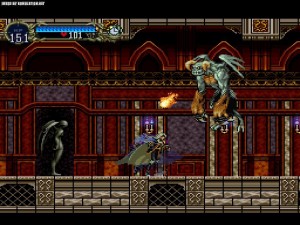What does a Castlevania game have to do with RPGs?
Posted by Rampant Coyote on March 19, 2015
 I can’t say I’m a giant fan of “Metroidvania” games, personally, although I’ve played a decent amount of Castlevania: Symphony of the Night (never got *that* good at it, but it was enjoyable). I think my younger self would have enjoyed them a lot more – to the point of near-obsession. As it is… I can appreciate it, but not to that level. But I did like the incorporation of a few RPG-like elements into the platform-game when that sort of thing was still on the unusual side.
I can’t say I’m a giant fan of “Metroidvania” games, personally, although I’ve played a decent amount of Castlevania: Symphony of the Night (never got *that* good at it, but it was enjoyable). I think my younger self would have enjoyed them a lot more – to the point of near-obsession. As it is… I can appreciate it, but not to that level. But I did like the incorporation of a few RPG-like elements into the platform-game when that sort of thing was still on the unusual side.
Long-time veteran game designer (and Symphony of the Night creator) Koji “IGA” Igarashi recently spoke to Christian Nutt of Gamasutra about what makes those games tick, in his (obviously expert) opinion:
Castlevania‘s Koji Igarashi offers advice to today’s Metroidvania devs
The fascinating part of it for me, as I’m not a huge fan, was getting that perspective to help me wrap my brain around the genre. But there’s another point that he made that expands well beyond that particular niche:
“With games, even if you create an interesting and fun concept, that’s not going to come across if the controls make it impossible for others to realize it. Thus, I think it’s important to remember that the core of any game lies on top of how it’s controlled by gamers.”
This has been a piece I’ve been beating myself up over since the release of Frayed Knights: The Skull of S’makh-Daon. Or maybe even before. One of the big reasons I’ve loved tabletop RPGs is how it is such a free-form activity. At least that’s how I prefer to play. You can try literally anything, and a human moderator (the DM) tries to make sense of them and convert them into actions that impact the world via rules and judgment.
In a computer RPG – well, we try. But ultimately we’re constrained by the controls. And if we try to ignore that, the game becomes frustrating, confusing, too complicated, etc. Distilling a gazillion possible actions into something humanly navigable is not easy. And for someone trying to draw upon the old tabletop experiences for inspiration as much as classic computer games, it can be downright painful.
I guess that’s why they pay us the big bucks. Oh, wait, no, they don’t…
Filed Under: Design - Comments: 2 Comments to Read
Tesh said,
Tangentially, the concern about controls is a big part of why I don’t like Wii, Kinect or PSMove games. I hate those control schemes in general, but beyond that, many games don’t use them well.
…more to the point, though, I agree that channeling tabletop RPGs into computer/console games is tricky. I think this is why so many wind up so formulaic and grindy, to give the sense that something is happening and that players are making progress. Computers need things quantified, so in many ways we’re kind of stuck building games around numbers.
Xenovore said,
My favorite thing to harp on (at the risk of sounding like Jan): “UI, UI, UI!” =)
@Tesh: Motion control is tricky. It can be really cool when done well, but most of the time it isn’t done well. =\